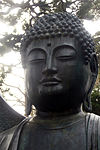Ama Samy
Ama Samy | |
|---|---|
 | |
| Title | Zen master Jesuit |
| Personal life | |
| Born | 1936 |
| Religious life | |
| Religion | Zen Buddhism, Christianity |
| School | Bodhi Sangha |
| Lineage | Harada-Yasutani |
| Senior posting | |
| Teacher | Yamada Koun |
| Website | bodhisangha.net |
| Part of a series on |
| Zen Buddhism |
|---|
 |
| Part of a series on |
| Western Buddhism |
|---|
 |
Ama Samy (Arul Maria Arokiasamy), S.J., born in 1936, is an Indian Zen master and Jesuit priest.[1][2][3]
Biography
[edit]Ama Samy was born to Christian parents in Burma in 1936 and grew up in India. After becoming a Jesuit priest in 1972, he began visiting Hindu ashrams and Buddhist meditation centers. He was introduced to Ramana Maharshi's teachings by Swami Abhishiktananda. His searching led him to become a wandering beggar for a period and to settle down as a hermit.[4][3] With the help of Father Hugo Enomiya-Lassalle, he visited Japan and trained with Yamada Koun Roshi of Sanbo Kyodan. In 1982, Yamada Roshi authorized him to teach Zen.[1][2][3] He received the Japanese Dharma name Gen'un-ken (Gen: dark, obscure, mystery; Un: cloud).[5]
Ama Samy founded the Bodhi Sangha, the community of his disciples, in 1986. Bodhi Sangha became an independent Zen school when he left the Sanbo Kyodan organization in 2002.[6][3][7] Ama Samy's method of teaching embraces both Soto and Rinzai Zen traditions and draws from the resources of Christianity and other religions.[4] He lives and teaches at Bodhi Zendo Zen Center near Kodaikanal in South India (opened in 1996).[8] Since Father Lassalle first invited Ama Samy to join him on a tour to Europe in 1985, Ama Samy has spent several months each year leading retreats in Europe, Australia, and the US.[4][3] With the help of his students, he also runs Little Flower, a non-profit organization supporting women, children and landless people in South India.[9]
Dharma Successors
[edit]Ama Samy has appointed the following teachers:
- de:Stefan Bauberger (b. 1960), Zen master, resides in Germany, separated from Bodhi Sangha in 2009[6][10]
- Johannes Fischer (b. 1957), Zen master, resides in Germany, separated from Bodhi Sangha in 2018[6][11]
- Carl Hooper (b. 1943), Zen master, resides in Australia[6][12][13]
- Gert Lüderitz (b. 1950), Zen master, resides in Germany[6][14]
- Mathew, Cyril Antony, SJ (b. 1970), Zen master, resides in India[6][15]
- Angela Pliske (b. 1937), Sensei (Zen teacher), resides in Czech Republic[6]
- Olaf Strelcyk (b. 1978), Zen master, resides in the United States[6][16][17]
Books
[edit]In English:
- Samy, Ama (2013). Zen: The Wayless Way. ASIN B00K7Z645S.
- Samy, Ama (2012). Zen: The Great Way has No Gates. ISBN 978-9381597248.
- Samy, Ama (2010). Zen: Ancient and Modern, The Way to Heart-Mind. ISBN 978-9380253411.
- Samy, Ama (2007). The Zen Way: Tradition, Transmission, Challenges. ISBN 978-8189882143.
- Samy, Ama (2006). Zen Meditation for Life and Death, Christians and Therapists. ISBN 978-8186778555.
- Samy, Ama (2005). Zen: Awakening to Your Original Face. ISBN 978-8185602868.
- Samy, Ama (2002). Zen Heart, Zen Mind: The Teachings of Zen Master Ama Samy. ISBN 978-8185602813.
In German:
- Samy, Ama (2014). ZEN - Der große Weg ist ohne Tor. ISBN 978-3899018127.
- Samy, Ama (2007). Zen - Praxis und Dialog. ISBN 978-3932337079.
- Samy, Ama (2005). Zen und Erleuchtung: Zehn Meditationen eines Zen Meisters. ISBN 978-3896202567.
- Samy, Ama (2002). Zen: Erwachen zum ursprünglichen Gesicht. ISBN 978-3896201928.
- Samy, Ama (1995). Warum Bodhidharma in den Westen kam oder kann es ein europäisches Zen geben?. ISBN 978-3895680052.
- Samy, Ama (1991). Leere und Fülle. Zen aus Indien in christlicher Praxis. ISBN 978-3466203505.
In Dutch:
- Samy, Ama (2006). Zen Hart, Zen Geest - op zoek naar je Oorspronkelijk Gelaat. ISBN 978-9056701369.
- Samy, Ama (1998). Waarom kwam Bodhidharma naar het Westen? de ontmoeting van zen met het Westen. ISBN 978-9056700249.
In French:
- Samy, Ama (2010). Coeur zen, esprit zen: Les enseignements du maître zen Ama Samy. ISBN 978-2354320492.
In Spanish:
- Samy, Ama (1998). Por qué Bodhidharma vino a occidente? La Transmisión del Zen: problemas, peligros y promesa. ISBN 978-8493622718.
- Samy, Ama (1995). Vacío Y Plenitud: Zen de la India en la práctica cristiana. ISBN 978-8428517393.
In Swedish:
- Samy, Ama (1997). Om överföringen av Zen till väst - Varfö kom Bodhidharma till väst?. ISBN 978-9163052521.
See also
[edit]References
[edit]- ^ a b Sharf, Robert H. (1995). Sanbokyodan, Zen and the Way of the New Religions. Japanese Journal of Religious Studies, Vol. 22, 3-4, pp. 417-458.
- ^ a b Kyosho no. 231 (1991), Newsletter of the Religious Foundation Sanbokyodan, edited by Sanbokoryukai.
- ^ a b c d e Baatz, Ursula (2009). Erleuchtung trifft Auferstehung, Zen-Buddhismus und Christentum, eine Orientierung. pp. 185–195. ISBN 978-3783195286.
- ^ a b c Samy, Ama (2005). Zen: Awakening to Your Original Face. pp. 26–33. ISBN 978-8185602868.
- ^ Habito, Ruben L. F. (1990). In Memoriam: Yamada Koun Roshi (1907-1989). Buddhist-Christian Studies, Vol. 10, 1990 (1990), pp. 231-237.
- ^ a b c d e f g h Ciolek, T. Matthew. 1995-present. Sanbo Kyodan: Harada-Yasutani School of Zen Buddhism and its Teachers. Canberra: www.ciolek.com - Asia Pacific Research Online. "Zen Buddhism: Sanbo Kyodan: Harada-Yasutani School and its Teachers". Archived from the original on 2018-10-13. Retrieved 2018-10-13.
- ^ "Bodhi Sangha".
- ^ "Bodhi Zendo".
- ^ "Little Flower Association".
- ^ "Zen-Guide Deutschland | Schule des Herzgrundes".
- ^ "Über mich | Zen | Johannes Fischer".
- ^ "Carl Hooper, Australia".
- ^ "Bodhimountzendo: TEACHER".
- ^ "Gert Lüderitz, Germany".
- ^ "Cyril Mathew, India".
- ^ "Teachers | Loveland Zen".
- ^ "Olaf Strelcyk, United States".
